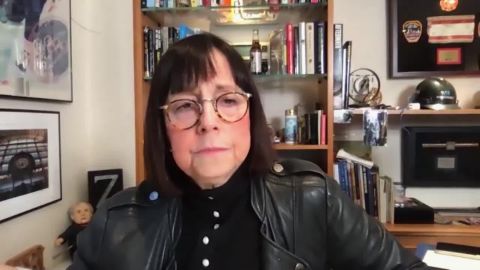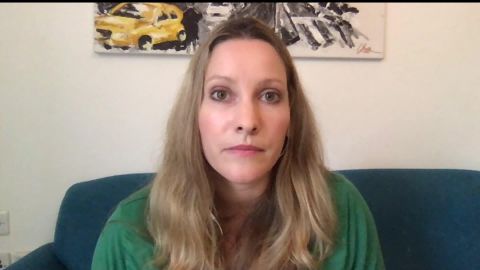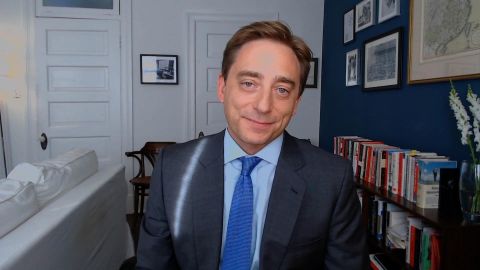Read Transcript EXPAND
CHRISTIANE AMANPOUR: Now our next guest is a veteran of political and election battles. Susan Zirinsky is the first President and Senior Executive producer of CBS News. I mean, the first woman in that role. Her career already spans more than four decades at CBS beginning right after the Watergate scandal. And yes, she was also the inspiration for Holly Hunter’s character in the 1987 film broadcast news. Here she is now speaking to our Walter Isaacson about the backstory on that famous “60 Minutes” interview with President Trump and the challenges of covering this election.
WALTER ISAACSON: Thank you, Christiane. And Susan Zirinsky. Hey, welcome to the show.
SUSAN ZIRINSKY, PRESIDENT, CBS NEWS: Thank you. Thanks for having me.
ISAACSON: Well, so “60 Minutes”, your CBS show, not only covering the news, but made news in the past week, because Trump walked off of an interview with Lesley Stahl got very upset. What happened? And what happened when you got called by your producers by Lesley Stahl? What was it like?
ZIRINSKY: Well, you know, the dynamic of the race is at a fever pitch. So, and the interviews were happening at a point — at the precipice of what really is a dynamic complex election. So, we knew it wasn’t going to be just a normal interview. But we’re prepared. And Lesley had interviewed Trump several times before, and they had a very good report with tough questions. And he was in the game, he was in it with her, it never was fractured. But from the get go, this interview became a kind of permanent sparring for the duration of the interview. So, when I get called, you know, I get called after the fact. I’m not there, Bill Owens is there. And he said to me, well, this didn’t quite go as planned. And I said, OK, what do you mean? And he said, well, there was a certain point at in the interview where there was a stop to discuss how much time was left. And at that point, the President turns to his deputy Hope Hicks and says, I think this — I think we’ve had enough. I think we’ve got plenty of this interview and proceeded to get up and everybody’s kind of quiet. And Lesley says to the President, as he — could have seen and it’s been on tape, as he’s walking out through the maze of light, be careful scrounge. I think what ends up happening next is we’re not quite sure is he going to come back? And so bill describes the scene as calm, but a little confused. We talked to the White House aide’s bill and the producers on hand. We were told he wasn’t coming back. And the reality was Pence was next. We were supposed to do a walk and talk that wasn’t going to happen. Pence walks in, sits down. Something else that we didn’t play with them at the beginning was, Trump was tweeting very directly, that she was not wearing a mask in the White House. And they put out a couple of pictures. Lesley entered the White House wearing a mask. When she greeted the President, she was wearing a mask. She took it off, as the interview was about to begin in the socially distance, interview position and took her mask off. When Trump walked out. She did get up and talk to the producers, all of whom had tested negative that day before the day of. But they were constant — there were a lot of tweets about Lesley wasn’t wearing a mask. We did not — we decided we weren’t going to play tit for tat, you know? What was the purpose, cat and mouse game? Irrelevant. Our purpose was to provide the American people with a smart, textured, contextualized interview. And so in the story, we did show her with the mask, greeting the President, elbow bumps, sitting down, taking the mask off.
ISAACSON: The President says that she just interrupted over and over again. And she did, she was very tough. A lot of interruptions. Do you think that perhaps she was too aggressive? I mean, a lot of people said, you know, she was coming on real strong.
ZIRINSKY: Look, I think in an interview it is a very different style if you’re doing a live interview, if you’re doing a taped interview. When you are in a taped interview, there is a little bit more flexibility. But when Leslie was aggressive or continued to press on some of these really important issues. There was never a moment where she lost respect for President Trump or the office of the presidency. It was constantly President Trump, Mr. Trump, can I interrupt you? It was extremely aggressive. It was extremely respectful.
ISAACSON: Do you have to make sure that when you do President Trump and then Vice President Biden that you aren’t looking as if you’re being softer on Biden the way Trump said you were?
ZIRINSKY: You know, this was a very important point for us. Because his criticism and others often say that Biden isn’t asked the same tough questions. The Biden interview was tough. Our interview with Kamala Harris was tough. And here’s how you know you did your job. We got an equal amount of people writing us and saying you were really too tough on President Trump. And the other half of those comments on Twitter and on social media, you were really hard on former Vice President Biden and Kamala Harris. So you know what, we did our job because the equal critique of both sides meant OK.
ISAACSON: By tweeting out as much as he did about Lesley Stahl and being pretty brutal in his comments about Lesley Stahl afterwards. Do you think that was appropriate? I mean, some people have said that it’s even caused her to have security issues. Do you think it’s dangerous for the President to be doing stuff like that?
ZIRINSKY: Look, we’re at the precipice of one of the most important elections of our time. No one knows how this race is going to go. And I, you know, I think he is — he felt he was being too tough. He answered that call. I don’t think there’s a single rally he does, where he’s really — he knows how to play the crowd. And in his mind, playing to the crowd and this even though it was a one on one interview, was he knew it would be edited. He knew it would be out there. I, you know, look, I think that he — you can’t determine how anyone will react. In a tough interview, you can predict how Donald Trump will react in the tough interview, because it’s always the same. And it does seem to take on a little bit of a different character when it’s with a woman and a man.
ISAACSON: What are you going to do differently on election night because of the nature of this election?
ZIRINSKY: We developed what we call the battleground tracker. We have never, and at least in my history in this company, or ever, sold unique CBS polls in 50 states. We will, by Election Day, have talked to 100,000 people, some of them more than once. We are also working with several consortiums that go state by state. So we will know how many mail in ballots were requested. What’s Republican, what’s Democrat? We’re talking to those people. Early voting on in polls. We are talking the exit polls exist for that. So, our data base, our proprietary information flow is really based on a lot of past work. And so I think that this election, we are prepared because of the dynamic nature of this election with a database that will help us in our assessment. You know, every hour, every half hour, we are going to — as the polls close, we really are going to characterize these votes. But what’s really important in this election with this much pressure on us and accuracy is we have to be very transparent. We have to be — we are going to be saying, this is what we know right now. I do not think that there is a single person in this country that has not been touched in some way by COVID, systemic racism, social injustice, economic fall on it. I really think that our coverage will reflect the historic nature of this vote. And, look, we’re continuing to, you know, really embrace and run with some of the critical issues running up to the election. It’s voter integrity. It’s disinformation. And these are things that we’ll carry with us into election night. You know, we have to really be mindful. Will misinformation be aimed at influencing the electric and can we spot it? Can we spot it?
ISAACSON: So how does everything you said affect the way you cover a president that calls the press the enemy of the people?
ZIRINSKY: When I took this job, it was a very– I thought it might — I might be the shortest lived president of any news division. Norah O’Donnell’s first night of anchoring. And it was the weekend after the President had talked about the group of four on Capitol Hill and said, go back to where you came from. And I literally, I was not in the job very long. And there was a very heated discussion among the senior staff that we should call the President racist. And I, several of us just went back and forth. And we said, I don’t know what was in the President’s mind. But I walked away and I came back to my office and I, actually, because we were working on another project, I had very accessible to me, some of the Edward R. Murrow hearings with McCarthy. And I listened to them. And I listened to his verbiage of what he was doing. And I listened to the Edward — one of the Edward R. Murrow sequences out after that night. And then I looked at the origin of the expression, both pointed me in the direction of I can’t characterize what is in the President’s head. But what I can say is the remarks were racist. And Norah, and I had long conversation about it. And she was comfortable. And that’s what we did. And I will say, we were alone for a couple of days before other people began to do that. You know, we are not the enemy of the people. And a democracy cannot exist without a free press. And if you tune out the noise, and you just kind of block the personal attacks, you don’t take on the sparring role, you don’t take the bait. What’s most important to me, as the president of this organization, what’s the question we’re asking in any briefing in any press conference that’s important to the American people? I don’t care what he’s calling us. We have a job. That’s the focus.
ISAACSON: When you took over CBS News, it had been roiled by a lot of Me Too scandals and things like that. Subsequently, almost every show you have is fronted by angered by a woman. Was that a conscious decision or that just happened?
ZIRINSKY: You know what, it wasn’t a conscious decision. It was not a conscious decision. I — look, when I came in, there was a lot to do. We remade the shows. But I looked for who is the best qualified, who would have the most interesting insights, who had experience. And, you know, the Me Too Movement began as something that, you know, I’m very lucky in the sense I had not experienced it. You know, I started working at CBS while I was in college on the weekends. I was alone in the newsroom the night of the Saturday night massacre, because the desk — the man running the desk had gone up the street to get food. There was free cellphone. I feel like a dinosaur. But the reality was, I began to understand it. I began to understand the lack of respect for women early on. I had to deliver an envelope to Lesley Stahl’s desk. She and Connie Chung were kind of the junior reporters. I couldn’t even find their desks. They were like in a back hallway. I felt like Alice in Wonderland, I fall into the looking glass. But what I really saw happen, and CBS and the dearly departed Bill Small as the bureau chief was very, very focused on who’s the best reporter and he really gave the Lesley Stahl and Connie Chung’s their chance. But turning the clock forward, I think that the placement of women was not specific. I need a woman in that job. It’s, I want to put the best team together. And hey, look, guess what? We have really smart, qualified women. Norah O’Donnell, is whip smart. She’s covered six presidential campaign. She covered Congress, the White House, the Pentagon. You know, there is a rich layer of experience among women. And for a long time, they were kind of like the buddies. They were micro aggressions, which weren’t addressed. Same as with the black community. And, you know, we are very aggressive about race and culture at CBS. And I think one of the most shocking realizations for me at this company. Here we are, we’re reporting on George Floyd. We’re reporting on a movement. We had to turn the mirror on ourselves. And what I found was pretty shocking. I really, really understood that there wasn’t a single person of color at CBS News, who hadn’t gone through something. Race based in their careers at CBS News. That had to change and had to change. And you know, it’s not going to happen overnight. We have formed a race and culture unit that talks to all the shows. We are a different organization. Are we a we finished? Hell no. I’ll be dead before they’re finished. But if it my responsibility, which I feel enormous responsibility both right now for politics, covering this election, and racial sensitivity, race and culture sensitivity and turning that tide around in this organization. I do anything in the time I have here. Aside from being a good journalist, a fair journalist and unbiased journalist, it’s really fixing the inequities in my own company that have existed for way too long.
ISAACSON: This new media landscape has produced a hurricane of misinformation. How do you deal with that?
ZIRINSKY: This is also where we have to become known as the purveyors of truth. And I think that’s reputational. And I think that — look, we live in a world where people gravitate towards their point of view, you know, this is their thing. But I think quite frankly, there has been a shift. And I think people are hungry for something that is straight down the middle, objective. And I think that that comes from us, advertising it, being there, being out, going to public speaking, putting our message out, that well, who are we. We are, journalists, we are unbiased, we are seeking the truth. And, you know, you have to compete. And there will be a Darwinian aspect to surviving in this mega era of just multi channels of noise coming at you. Don’t underestimate people. They’re pretty smart. Some people will always gravitate towards the point of view that they want to. But there are some very smart people in the middle of the country, in the south, in the north, in the West, the Pacific Northwest, in the east, who are really hungry for information. And I just — we — our job is to continue to put it out there and talk about ourselves as this is where we see this. We’re not giving you opinions, unless we tell you we’re giving opinions which doesn’t really happened. So, I think it’s our job to communicate our position of true journalism, fair and unbiased and transparent.
ISAACSON: Susan Zirinsky, thank you so much for being with us this evening.
ZIRINSKY: Thanks. Thanks for having me.
About This Episode EXPAND
Christiane speaks with Evan Osnos about his new book ““Joe Biden: The Life, The Run and What Matters Now.” She also speaks with Laura Bates, who studies the impact of toxic masculinity. Walter Isaacson speaks with CBS News President Susan Zirinsky about the challenges of covering this unique election.
LEARN MORE


